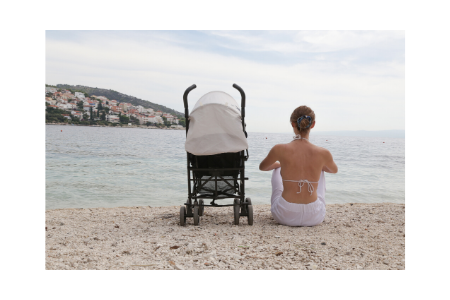The Skin You're In

The Skin You're In
Pregnancy and postpartum stimulate a wide variety of feelings about our bodies. Even a sturdy pre-pregnancy body image can be ravaged by the unexpected and sometimes permanent body changes that accompany the process of becoming a mother. Our culture, esp. among certain social classes, makes no secret of how important it is that women "get their bodies back" instantaneously. There is too little attention paid to the vital reasons our bodies morph, hold on to baby weight for a period of time and how these processes positively serve both baby and mother.
Maternal depression increases risk of adverse perinatal outcomes, and recent evidence suggests that negative body image may play an important role in perinatal and postpartum depression. In a review of the literature, studies consistently found a positive association between body image dissatisfaction and perinatal/postnatal depression. Findings were consistent across different aspects of body image and various pregnancy and postpartum time periods, but demonstrating a spike in onset of depression between 6-12 months postpartum in women with negative body images.
Perinatal depression is defined as depression affecting women during pregnancy and within the first 12 months following delivery. Risk factors for perinatal depression include prior depression, low self-esteem, stressful life events, marital stress and low social support. In the perinatal period, depression may adversely affect the physical and emotional health of the mother, including increased risk for further depressive episodes, with a negative impact on parenting and care taking behaviors (including eating disorders and decreased rates of breastfeeding) and the physical and cognitive development of the child.
There are ways we can endeavor to take good care of ourselves as we undergo body changes which occur during pregnancy and the postpartum period.
- Acknowledge the transformation. Being keenly aware of our reactions and acknowledging the normality of body changes can help our ability to accept and cope with these changes.
- Notice self talk and cultural feedback. We benefit greatly when we identify patterns of body related thinking that sting rather than support. Mainstream media images mixed with unsolicited body comments can create challenging road blocks that thwart our feelings of ease in our pregnant/postpartum bodies.Adapting mantras of body compassion might be the antidote to succumbing to full fledged body angst.
- Body Acceptance. Acceptance can be a tall order in the midst of fret, self-loathing or anxiety that your body will be forever changed. But, worrying doesn't modify what may or may not happen to your body and steals us from the present moment. Embracing that the changes are normal and important to our body's healthy growth and development allow us to enjoy rather than resist the experience of creating and sustaining life.
- Keep an eye on role modeling. Begin gentle, positive and accepting with ourselves as we navigate body image concerns provide an ideal template from which to parent. Its tempting to think our little ones don't pick up on our body dis-ease, but they do and it has an impact on how your child thinks about their bodies.
In conclusion, pregnant and postpartum women's bodies need to be supported and celebrated. We need to strive to replace negative, unrealistic body images with positive healthy images not only in women's minds but in the mainstream media as well.
Kathleen Johnson, CNM

SHARE